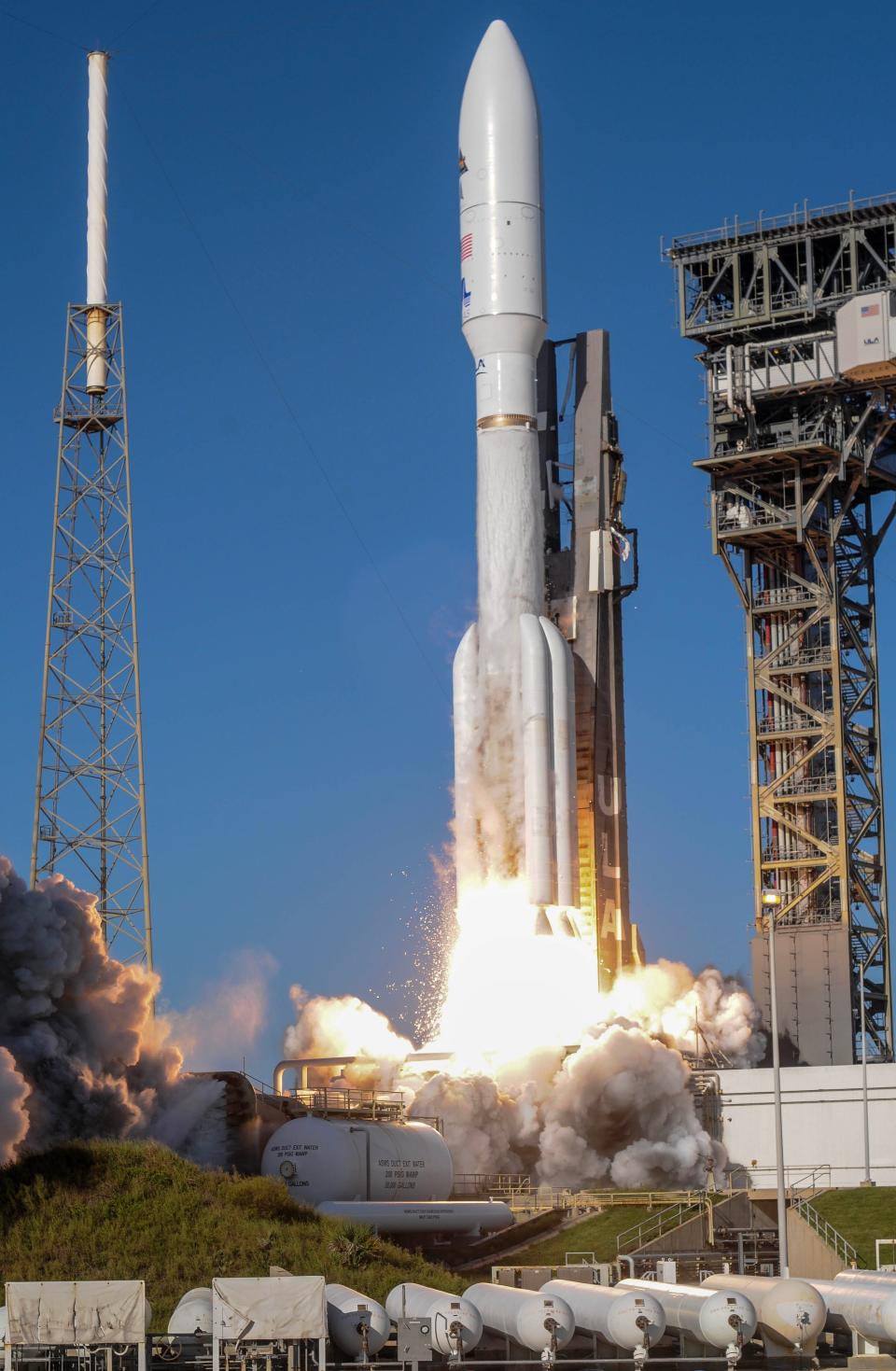Powerful ULA Atlas V rocket launched national security mission after scrub, hurricane delay
The most powerful verison of United Launch Alliance's Atlas V rocket leapt off its Cape Canaveral pad Sunday morning, for a national security mission for the U.S. Space Force and National Reconnaissance Office.
ULA teams scrubbed the first launch attempt early Saturday morning due to "an issue found during a prelaunch ordnance circuit continuity check." A day later, the countdown proceeded without issue, and the mission was able to launch into a cloudless sky arcing away from the Space Coast on an easterly trajectory over the Atlantic Ocean.
The 196-foot rocket took to the skies at 8:47 a.m. EDT on Sunday with the SILENTBARKER/NROL-107 payloads destined for geosynchronous orbit. The flight came after teams were forced to stand down last month to roll the rocket back to ULA's vertical integration facility for protection from Hurricane Idalia.
What was the SILENTBARKER/NROL-107 mission payload?
Sunday's mission featured multiple payloads as a joint effort for the U.S. Space Force and National Reconnaissance Office. The spacecraft were part of the Space Force's SILENTBARKER satellite constellation network intended to provide space situational awareness, orbital surveillance, and tracking.
According to a statement by ULA, "SILENTBARKER is designed to detect and maintain custody of space objects. This capability enables indications & warnings of threats against high-value assets in geosynchronous orbit."

The mission's destination of geosynchronous orbit, about 24,000 miles above the Earth, required ULA's most powerful variation of its Atlas V rocket, the 551, capable of 2.3 million pounds of thrust courtesy of one main engine and five add-on solid rocket boosters.
"This is our "Bruiser" configuration of the Atlas," ULA CEO Tory Bruno said.
Sunday's flight marked the 48th launch from Florida's Space Coast this year as well as ULA's 18th and final NRO mission aboard an Atlas V rocket since 2007. Going forward, national security missions launched by ULA will fly aboard the company's next-generation Vulcan Centaur rocket.
The debut test flight of that vehicle is expected to happen from the Cape sometime before the end of this year.
When is the next rocket launch from Florida?
Though still unconfirmed by SpaceX, federal filings point to the next launch from Florida's Space Coast to be another Falcon 9 Starlink mission from Cape Canaveral Space Force Station.
Liftoff of the Starlink 6-16 mission with another batch of the company's flat-pack, internet-beaming satellites from Launch Complex 40 is set to occur during a four-hour launch window that opens at 8:30 p.m. EDT on Thursday.
When that mission does launch, follow FLORIDA TODAY's Space Team live launch coverage beginning 90 minutes liftoff. For the latest schedule updates, visit floridatoday.com/launchschedule.
Contact Jamie Groh at JGroh@floridatoday.com and follow her on X at @AlteredJamie.
Launch Thursday, September 14
Company / Agency: Internal SpaceX mission
Rocket: SpaceX Falcon 9
Location: Launch Complex 40 at Cape Canaveral Space Force Station
Launch Window: 8:30 p.m. to 1:02 a.m. EDT Friday, Sept. 15
Trajectory: Southeast
Weather: TBD
Landing: Drone ship
Live coverage: Starts 90 minutes before liftoff at floridatoday.com/space
About: A SpaceX Falcon 9 rocket will launch the company's latest batch of Starlink internet satellites from Cape Canaveral Space Force Station in Florida.
This article originally appeared on Florida Today: After a scrub and hurricane delay ULA launched a Space Force mission

